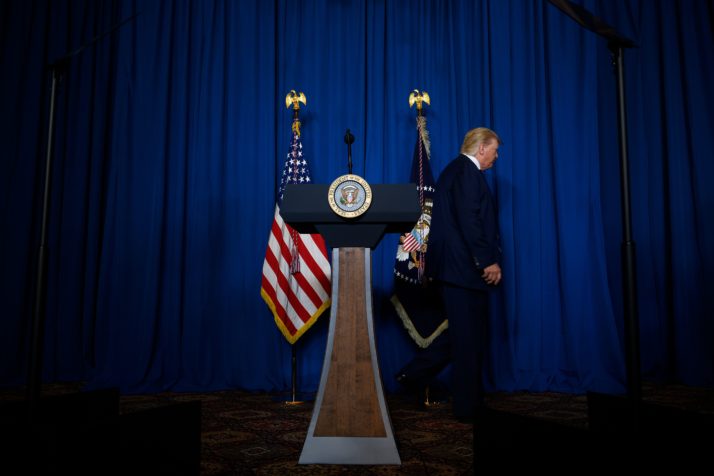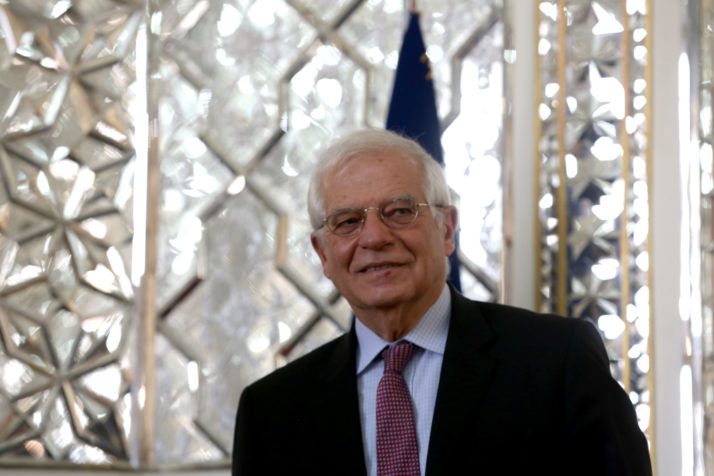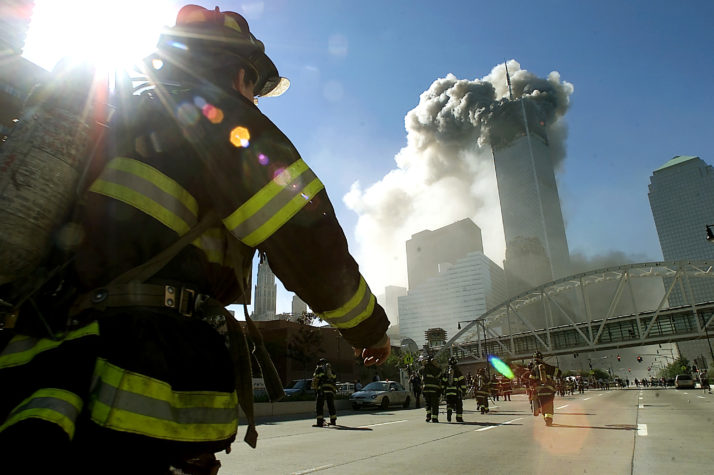As the biggest minds on global security policy gather for the Munich Security Conference this week, EU leaders won’t quite fit in with many of the other top leaders present — for better or worse, Brussels still doesn’t have the hard power to kill anyone.
In that sense, the European Union’s foreign policy chief Josep Borrell, and the EU commissioners in his delegation, are not part of what some experts say is the gravest, most immediate security threat: Now, as much as ever, the most dangerous people in the world are those entrusted with running it.
“The biggest things that have caused massive instability in the world — market-moving instability that lasts for a long time — you are talking about heads of country,” said Ian Bremmer, president of Eurasia Group, a New York consulting firm focused on political risks. “You are not talking about terrorists.”
Many of these leaders, or their top advisers, will be in Munich for the Friday-Sunday conference, but long-time attendees say there is unlikely to be much introspection.
While this year’s theme is “Westlessness” — a collective fretting about the decline of the West — analysts say a broader, more pernicious collapse is underway, one that includes growing disregard of long-standing international legal conventions on how armed conflicts are fought, as well a dangerous new way of talking about, even celebrating, deadly military strikes.
Russian President Vladimir Putin has been one of the most brazen among world leaders when it comes to extrajudicial killings on foreign soil.
Together, these changes mark an erosion of the “just war” tradition of military ethics — jus bellum justum — that stretches back millennia and provided a moral framework for leaders to use force.
And they raise some uncomfortable questions — unlikely to be addressed in Munich or Brussels anytime soon — about whether the EU is at all prepared to deal with increasingly murderous geopolitical partners, and in the longer term if the EU’s own push for greater military and defense capabilities, perhaps including the development of an EU army, is really in keeping with the bloc’s core aims of peace and prosperity.
While the EU’s arsenal remains largely limited to economic sanctions, other leaders are increasingly asserting deadly power with murky objectives, and using asymmetrical means — targeted killings, cyberattacks and other hybrid measures, at times employing proxy forces that include mercenaries and private militias.
This year started with “World War 3” trending on social media after a U.S. rocket attack, ordered by President Donald Trump, killed Iranian General Qassem Soleimani — a strike critics have called an illegal assassination.

U.S. President Donald Trump was bombastic in the wake of the Qassem Soleimani assassination | Jim Watson/AFP via Getty Images
Where in the past governments might not have commented immediately on such a killing, Trump was quick to boast, and glib in doing so, tweeting an emoji of an American flag moments before officials announced Soleimani’s death.
Donald Trump Jr. was even more egregiously boastful after the U.S. this month killed Qassim al-Rimi, an al-Qaeda leader in Yemen. The president’s son praised and thanked his father for the killing on Twitter, while simultaneously leveling a political attack at U.S. Democrats over the Iowa caucuses (and maintaining a family tradition, by misspelling “Qaeda”).
President Trump has also shown little concern about other conventions on warfare in international law, as when he threatened to bomb cultural sites in Iran, and then doubled down when told it would be a violation of The Hague Convention.
“They’re allowed to kill our people,” Trump griped to reporters. “They’re allowed to torture and maim our people. They’re allowed to use roadside bombs and blow up our people. And we’re not allowed to touch their cultural sites? It doesn’t work that way.”
Except it does work that way, according to legal experts — or is supposed to anyway. But Trump’s attitude has emboldened other leaders who have perhaps even less regard for so-called Western norms.
Russian President Vladimir Putin has been one of the most brazen among world leaders when it comes to extrajudicial killings on foreign soil.
Experts said it often seems that Pope Francis is the only leader with an international platform advocating strenuously for nonviolence these days.
In a press conference in December at the Élysée Palace, following talks in Paris on ending the war in eastern Ukraine, Putin all but admitted that Russia had assassinated a Chechen separatist, Zelimkhan Khangoshvili, in Berlin last August.
“I know that a man died in Berlin,” Putin said, replying to a question about the killing in his customary dry, cutting tone.
“It is a man who took an active part in the hostilities on the side of the separatists in the Caucasus … This man was wanted by us, and a very tough and bloody man.”
Sergey Lavrov, Russia’s longtime foreign minister, is expected in Munich, as is Prince Faisal bin Farhan Al Saud, the foreign minister of Saudi Arabia whose government, after many denials, accepted responsibility for the killing of Jamal Khashoggi, the Washington Post columnist, in the Saudi consulate in Istanbul.
Experts said it often seems that Pope Francis is the only leader with an international platform advocating strenuously for nonviolence these days.

Josep Borrell, the EU’s top diplomat, has acknowledged the bloc’s foreign policy limitations | Atta Kenare/AFP via Getty Images
EU leaders, who are often criticized for the lack of hard power to assert their soft power values, can at least take heart in knowing that historically, at least, they haven’t been major contributors to the global arms race.
While Trump once joked that former European Commission President Jean-Claude Juncker was a “brutal killer,” the EU still has neither drones nor soldiers to call upon.
Borrell has acknowledged the EU’s limits. “We barricade ourselves in the belief there is no military solution,” he told the European Parliament last month. “In Syria it has been a military solution, brought by the Turks and the Russians.” And the EU is likely to face continuing pressure to toughen up.
Security analysts point to two causes of the increasing sense of lawlessness: the rise of China, which does not share the Western view of human rights and democratic freedoms (as evidenced by its treatment of Uighur Muslims and democracy protesters in Hong Kong); and Washington’s steady retreat from the role of global policeman that it had played, however reluctantly, since the end of the Cold War.
In many ways, since the 9/11 terror attacks, it has sometimes seemed as if the world’s policeman has not taken early retirement so much as switched sides, said Andrew J. Bacevich, a historian and retired U.S. army colonel who is now president of the Quincy Institute for Responsible Statecraft in Washington.

According to one historian, the U.S. has changed its military philosophy since the 9/11 terrorist attacks | Jose Jimenez/Primera Hora/Getty Images
“Extraordinary renditions, the so-called Bush doctrine of preventive war, in which we declared that we had the prerogative of initiating a war against some entity that we suspect some day in the future might pose a threat, so we are going to eliminate the threat before it has become a threat — that is going rogue,” Bacevich said. “That is absolutely overthrowing restraints that nations had hitherto professed to respect.”
Andrew Fiala, a professor of philosophy and director of the Ethics Center at Fresno State University in California, said part of the problem is that advocates of nonviolence are often not invited to events like the Munich conference where they might encourage self-reflection.
“There is this kind of security establishment that really rules the conversation,” he said. “That’s part of the problem. There is a kind of presumption of militarism all the way through the global elites, there’s a shared concern that everything requires a military solution.”
“If all you have is a hammer,” Fiala said, “everything looks like a nail.”
Source: politico.com
See more here: news365.stream






